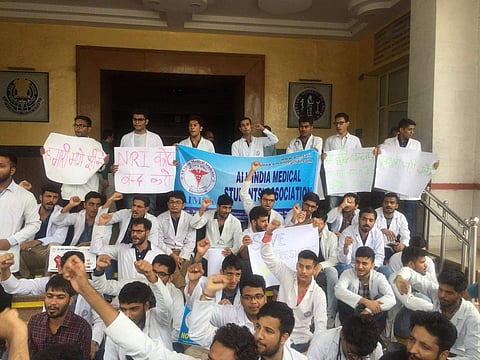

On July 23, Medical students and doctors, all over the country took to the streets, burning the copies of the new version of the National Medical Commission Bill. The bill that was tabled in the Lok Sabha on Monday had a lot of new provisions, which was opposed by medical students and practitioners.
"This bill is altering the basic structure of medical education and putting it into the lap of rich and influential. We won’t accept this corporate pleasing policy of GOI. Medical education is not for sale and neither it’s meant to strengthen few corporate mafias," says
Dr Harijit Singh Bhatti, a Senior Resident in AIIMS Delhi. The medical students have pointed out 14 provisions in the bill, which they find to be problematic. The protest is supported by the Indian Medical Association and the All India Medical Students' Association.
The new bill apparently allows a fee regulation only for 50 per cent of the MBBS seats in private medical colleges. The initial proposal here was to allow managements to affix the fee for 40 per cent seats. "This is highly problematic," says Bhatti. "This essentially means that half of the seats in any private medical college is a management seat. This will affect the poor medical aspirants a lot. The government is openly selling medical seats here," he says.
While replacing AIPMT with NEET is still widely argued, the new bill has now introduced a new examination for the medical students. After its implementation, every MBBS student will have to clear a common exam called the National Exit Test (NEXT), which will also serve as the screening test for doctors with foreign medical qualifications. Here's why the students are against it. "Examination system in India isn't perfect. Exams get fixed in most private medical colleges. So this will take the chance away from the meritorious students studying in government colleges," says Bhatti.
Another point of debate here was the introduction of a six-month-long bridge course to train physiotherapists, nurses, AYUSH doctors and mid-level practitioners to train them to treat the patients in Public Health Centres. Even though the government hasn't given a nod to this demand, the bill says, "It has been left to the State Governments to take necessary measures for addressing and promoting primary health care in rural areas." "How can someone be a doctor in six months? By doing this, the government is putting the rural poor's health at stake," says Bhatti.
A few medical students are currently on hunger strike, asking the government to remove the controversial amendments in the bill. The IMA has also planned a protest by burning the copies of the bill on all its branches on Thursday. Bhatti says that a delegation of medical students have met the health minister Dr Harsh Vardhan, raising their demands. "But unfortunately he said that nothing is in his hands," he says.
